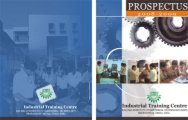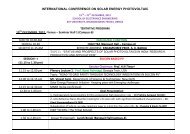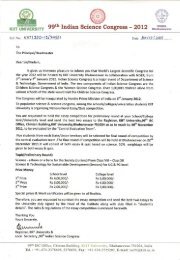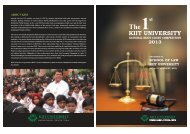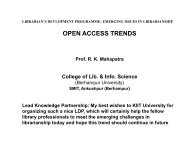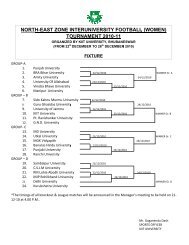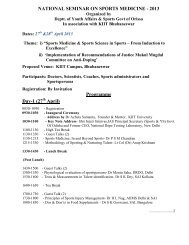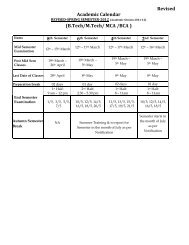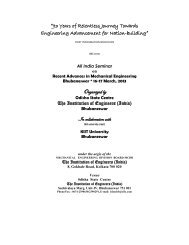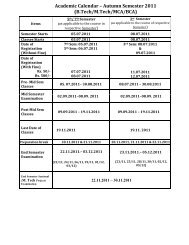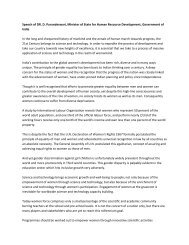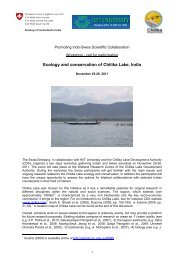PANEL ORGAN - KIIT University
PANEL ORGAN - KIIT University
PANEL ORGAN - KIIT University
You also want an ePaper? Increase the reach of your titles
YUMPU automatically turns print PDFs into web optimized ePapers that Google loves.
social-Cultural-personality development moreover holistic development in their lives<br />
which greatly affect the family and the society as well. With reference to pre-school<br />
education it reflects their living style, food habit, hygiene aspects and cultural beliefs.<br />
Apart from that most of the people (90%) are from different tribal groups. They need<br />
motivation along with great patience to make them convince for the pre-school education<br />
and make them to understand the importance and the need of education for the<br />
betterment in their community life.<br />
<strong>PANEL</strong>-02(A): CHILDREN IN PATRILINEAL AND MATRILINEAL SOCIETIES<br />
26 th November, 2012 Time: 14.00-16.30hrs Hall No.:<br />
<strong>PANEL</strong> <strong>ORGAN</strong>IZER<br />
RANJAN, Geetika, North Eastern Hill <strong>University</strong>, Shillong, India, E-mail:<br />
<br />
<strong>PANEL</strong> ABSTRACT<br />
The system of inheritance, descent and succession plays a dominant role in determining<br />
the attitude of a family and society at large towards its children. Certain studies have<br />
shown that in patrilineal societies the male children are mostly given a preferential<br />
treatment. For instance, in many patrilineal societies in India the birth of a male child is<br />
desperately prayed for as the boys are taken as retainers and transmitters of the family<br />
name and such an approach eventually leaves shadows over the other rights of the girl<br />
child in such societies such as quality of education being imparted to her, her nutritional<br />
requirements etc. In matrilineal societies the descent and inheritance is traced in female<br />
line. In communities like the Khasi of Meghalaya the youngest daughter inherits the major<br />
share of the parents’ property. The proposed panel shall attempt to unravel the position<br />
of children – male and female in matrilineal and patrilineal societies and their<br />
socialization under the two different canopies. It shall also explore the pertinent realities<br />
which lie between the general assumptions of girls calling the shots and boys being on the<br />
receiving end, in case of matrilineal societies and vice versa in the case of patrilineal<br />
societies.<br />
PAPER PRESENTERS<br />
NASIR, Rosina, Centre for the Study of Social Exclusion and Inclusive Policy, School of<br />
Social Sciences, <strong>University</strong> of Hyderabad, Hyderabad, AP, India, E-mail:<br />
<br />
Descent: Conceptual and Operational View<br />
Radical feminists invariably accuse patriarchal structure and ingrained element of<br />
inheritance of property which is aligned with patrilineality for the social evils against<br />
women in society. It is needed to address the debate on the edifice of social structure<br />
wherein predominant space has been allocated to patrilineal descent instead of any other<br />
descent. Question arises that why and who has designed the social structure in favor of<br />
the dominant position of male thereby neglecting other biological variations. Would it be<br />
possible to assume a descent contributing the social structure which is being neutral in<br />
character in every aspect, left alone the biology This article represents an endeavor to<br />
comprehend the conceptual base for the shift from matrilineal to patrilineal descent, if it<br />
has been so and how this shift is aligned with benign social change ascertaining equitable<br />
position of women. Apart from conceptual review of the descent, in the present study an



